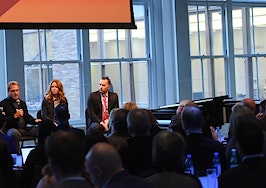It’s a $1 million algorithm and it’s more accurate than that one of the most polarizing pieces of technology in the industry.
Team ChaNJestimate was announced Wednesday as the winner of the $1 million Zillow Zestimate challenge, with an algorithm that beat the company’s own baseline by 13 percent. With the algorithm, Zillow expects their Zestimate’s error rate to fall from 4.5 percent to below four percent.
“People are incredibly passionate about their home and understanding its value, and we are amazed by the winning team’s hard work the past two years to make the Zestimate even more precise,” Stan Humphries, chief analytics officer and creator of the Zestimate, said in a statement.
“We’ve been on a 13-year journey making the Zestimate more accurate, and hosting Zillow Prize allowed us to invite thousands of brilliant data scientists from around the world to join us on this journey.
“We’re so proud that the winning team’s huge achievement, and the work of all the teams in the competition, will provide millions of homeowners with a better understanding of one of their biggest life investments,” Humphries added.
The winning team was comprised of Chahhou Mohamed of Morocco, Jordan Meyer of the United States, and Nima Shahbazi of Canada. In the first round, Shahbazi and Mohamed competed together and Meyer competed on his own, but the three joined forces, despite having never met, to combine their Zestimate models.
An estimated 3,800 teams entered the competition, which became one of the most popular ever on Kaggle, a platform where similar contests are hosted.
The winning algorithm incorporated machine learning techniques, including the use of neural networks to estimate home values and remove outlier data points that fed into their algorithm. It also leveraged publicly available data, including rental rates, commute times, home prices, road noise and different variables that factor into home price.
Shahbazi worked and estimated seven to eight hours a day on the project, in addition to his job.
Zillow has already begun to incorporate part of the winning team’s algorithm — as well as other ideas inspired by the competition — into their Zestimate model. With the improvements, the accuracy of the Zestimate could improve by thousands.
On average, the Zestimate is $10,000 off of the actual sale price of the home and with the learnings, future Zestimates will be approximately $1,300 closer.
The announcement of the winner comes nearly two years after launching the competition. The second place winner received $100,000 and the third place winner nabbed $50,000.
Errol Samuelson, the chief industry development officer at Zillow said the contest sort of reminded him of the early says of being a software engineer.
“Back then, there was a little bit of a culture like the wild west, and you didn’t necessarily have formal training to do something,” Samuelson said. “Data scientist feels like that early frontier still. It’s still a little bit of the wild west. You can be a solo artist in Japan. You can be three guys on the internet and win a $1 million prize. I like the spirit of it.”
The Zestimate is polarizing in the industry, with many feeling that it undermines the job of a real estate agents. Samuelson doesn’t feel that’s the case. He said real estate agents can take the Zestimate, show the consumer and show them why it’s not exact.
“Agents can use that and say, ‘that’s why you need a human because no matter how good the algorithm is, there’s always going to nuances that you’re going to need a human being to say the algorithm would never pick up on this, but let me tell you why this matters,'” Samuelson said. “Good agents use it as a way to prove their value.”
Samuelson said some people get frustrated with the Zestimate for two reasons. They don’t feel it’s accurate or they don’t believe there should be any online estimates.
“If you look at the way consumers think these days, a lot of times, they’re looking to do research on their own first,” Samuelson said. “And they’re still going to talk to an agent.”







